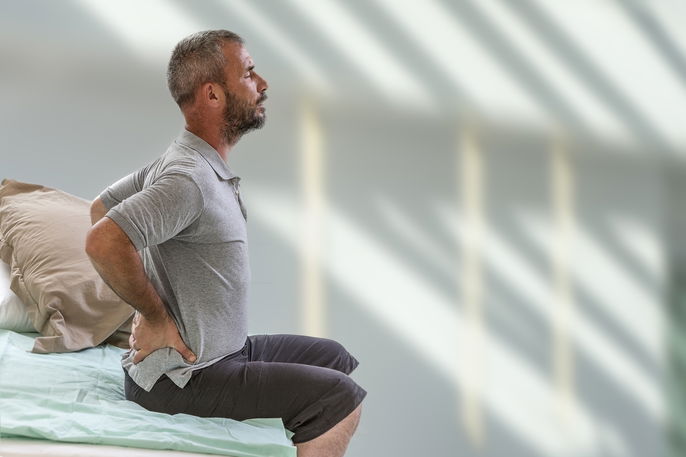Kidney stones are stone-like masses that can form anywhere along the urinary system. They often form as a result of a diet that is rich in protein and sodium, with low fluid intake, which makes the urine more concentrated and increases the risk of stones forming.
The main symptoms of kidney stones are severe pain in the lower back, which can limit activity, and pain when urinating. Other common symptoms include cloudy urine and fever above 38°C (or 100.4°F).
If you have any signs or symptoms that could suggest kidney stones, you should see your doctor or urologist for testing and possible treatment.

Causes of kidney stones
The formation of kidney stones can be influenced by several factors, the main ones being:
- Low fluid intake, which makes the urine more concentrated
- Diet rich in protein and/or sodium, and low in fiber
- Recurrent urinary tract infection (UTI)
- Genetic predisposition
- Inflammatory bowel diseases
- Hyperparathyroidism
- Obesity and sedentary lifestyle
- Frequent use of aspirin, antacids and diuretics.
In addition, kidney stones can also be caused by rare diseases such as primary or secondary hyperoxaluria. This disease is characterized by an accumulation of oxalate in the body due to a deficiency of enzymes responsible for metabolizing this compound. This causes a build-up of oxalate levels, which then results in kidney stones.
Common symptoms
Symptoms emerge when the stone is very large or if it travels through the urinary tract, causing pain and discomfort. Symptoms will vary in intensity depending on the location of the stone. The main symptoms of kidney stones are:
- Pain in the lower back that may limit activity
- Back pain that may radiate to the groin
- Cloudy urine, and in some cases blood in the urine
- Constant urge to pee
- Pain when urinating
- Fever above 38º C (or 100.4°F)
In cases where urine flow is obstructed or blocked by a stone, you may not be able to urinate, which will increase pain and discomfort. This may also increase the risk for a UTI. Read more about other kidney stone symptoms and how they can present.
Symptoms self-checker
To find out if you are at risk for having kidney stones, specify your symptoms in the quiz below:
Confirming a diagnosis
A diagnosis is confirmed by a family doctor or urologist by first assessing the signs and symptoms reported. Imaging, like ultrasound or X-ray, may be ordered to identify the size and location of a possible kidney stone, which is important as this will guide treatment.
The doctor may also recommended a urinalysis (also known as a “routine and microscopy” or “R & M” ) to investigate the stone's composition. This test can identify whether the stone is made up of calcium oxalate, uric acid, cystine or struvite.
Treatment options
Treatment for kidney stones must be carried out under the guidance of a nephrologist, urologist or general practitioner, and varies depending on the size and location of the stone, its composition, and severity of symptoms.
The main treatments for kidney stones are:
1. Pharmacy medications
The doctor may consider prescribing medication to relieve acute pain, such as diclofenac, acetaminophen, tramadol or scopolamine.
Also recommended: Kidney Pain: 8 Causes, How to Treat & What it Feels Like tuasaude.com/en/kidney-painAnother medication that is typically prescribed for kidney stones is tamsulosin. This medication acts by relaxing the ureter muscles to facilitate the elimination of stones measuring between 4 and 10 mm, when found in the ureter.
The doctor may also prescribe medications to prevent kidney stones formed by calcium, such as hydrochlorothiazide or chlorthalidone.
2. Surgery
Surgery for kidney stones is typically recommended for stones measuring larger than 6 mm or if they are blocking the passage of urine. It can be performed by the doctor using different techniques, which vary depending on the location of the stone.
Some options include extracorporeal shock wave lithotripsy, percutaneous nephrolithotomy or ureteroscopy.
3. Diet for kidney stones
A diet to treat and prevent kidney stones should be guided by a registered dietitian. You should opt for foods with high water content, such as cucumber, chayote or watermelon, and aim to increase water intake. This will help to promote the formation and elimination of urine.
Also recommended: 14 Natural Diuretic Teas for Fluid Retention tuasaude.com/en/natural-diureticsFurthermore, you should avoid added salt in your diet and reduce the amount of protein consumed on a daily basis to prevent the formation of kidney stones.
4. Natural treatment for kidney stones
Natural treatment for kidney stones, such as drinking chanca piedra tea or hibiscus tea, can help to increase urine volume. This helps to facilitate the elimination of the stone, while also providing anti-inflammatory action to relieve symptoms.
However, it is important to emphasize that natural treatment does not replace treatment recommended by a doctor. Therefore, it is always recommended to consult a nephrologist to investigate the cause of the formation of the stones and prevent new crises from arising again
Home remedies for kidney stones
Any natural treatments for kidney stones should be used as a complement to the treatment prescribed by your doctor. One great natural remedy is phyllanthus tea, which contains diuretic properties and facilitates the elimination of stones.
Read more about home remedies for your kidney stones that you can use at home.






























